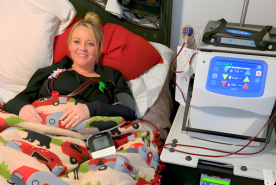
December 12, 2025
Advocacy
2025 Kidney Advocacy Wins: How NKF Helped Improved Care Nationwide

December 11, 2025
Advocacy
NKF Supports the Department of Health and Human Services’ New Kidney Transplant Transparency Policies

December 09, 2025
Patient Education
Celebrate the Holidays with Kidney-Friendly Recipes from Around the World

December 04, 2025
Patient Education
Home Dialysis FAQ: What to Know Before Starting Dialysis at Home

December 03, 2025
Professional Education
Closing Care Gaps in a Safety Net Healthcare Setting: Leveraging Home-Based CKD Testing to Improve Healthcare Quality

December 02, 2025
Patient Education
30 Last-Minute Kidney-Friendly Gifts That Show You Care

December 01, 2025
Resources & Tools
5 regalos perfectos para tu ser querido en diálisis

November 27, 2025
Patient Education
Medicamentos innovadores para cuidar tus riñones: Lo que debes preguntar a tu médico
Learn More About Kidney Health
Pagination
NKF Press Room
Access the latest press releases, media resources, and contact information from NKF.




